AMAZON BASIN (BP)—Eighteen Southern Baptist International Mission Board workers and their children watched with mixed emotions as the twin-prop plane took off from the jungle airstrip, headed back to the city.
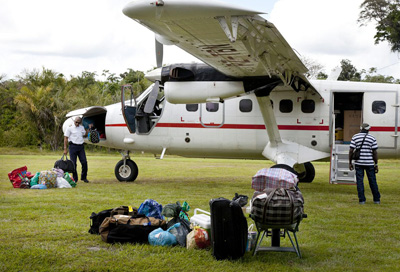 The remote region of the Amazon Basin where Southern Baptist missionaries learn about life in the wild is accessible only by small planes or a long trip in a narrow canoe. (BP Photo / Rebecca Springer, IMB)As they stood surrounded by wide rivers and miles of dense Amazon rain forest on all sides, reality began to sink in. They were on their own.
The remote region of the Amazon Basin where Southern Baptist missionaries learn about life in the wild is accessible only by small planes or a long trip in a narrow canoe. (BP Photo / Rebecca Springer, IMB)As they stood surrounded by wide rivers and miles of dense Amazon rain forest on all sides, reality began to sink in. They were on their own.
The group trudged through mud and stifling heat, loaded down with children, suitcases and boxes of supplies, before arriving at the camp—a row of simple wooden cabins beside a river—that would be home for the next month.
The missionaries—some new, some veterans—were the first group to arrive at the IMB’s jungle training center, designed to help missionaries learn to live and work in tough rural places.
Donny Barger, an IMB missionary and trainer who helped start the camp, said the program will better prepare missionaries going to work among nearly 230 unengaged, unreached people groups in isolated places throughout the Americas.
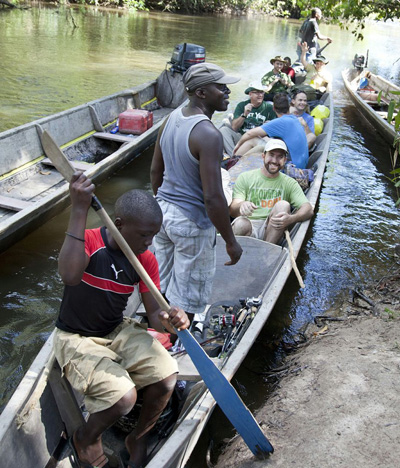 Students at the International Mission Board’s jungle training camp, helped by some locals, pile into a canoe to head upriver. (BP Photo / Rebecca Springer, IMB)“One of the things we hear most often from missionaries after they complete their first term is, ‘I really wish someone would have helped me understand what it was really going to be like going into an indigenous area,’” Barger said. “And sometimes (lack of preparation) causes you to make big mistakes with your people group that takes you a long time to get out of.”
Students at the International Mission Board’s jungle training camp, helped by some locals, pile into a canoe to head upriver. (BP Photo / Rebecca Springer, IMB)“One of the things we hear most often from missionaries after they complete their first term is, ‘I really wish someone would have helped me understand what it was really going to be like going into an indigenous area,’” Barger said. “And sometimes (lack of preparation) causes you to make big mistakes with your people group that takes you a long time to get out of.”
As the older kids set off to explore their new surroundings, the confused adults began learning how to set up a home in the jungle, asking basic questions: “Where will we sleep?” “Is the river safe to swim in?” “What is for dinner?”
The learning process had begun.
Before arriving, the trainees received limited information about the upcoming experience. They didn’t know what they’d eat or what they’d live in. Cooking options, bathroom facilities, sleeping arrangements and clean water sources all remained mysteries.
Sign up for our weekly edition and get all our headlines in your inbox on Thursdays
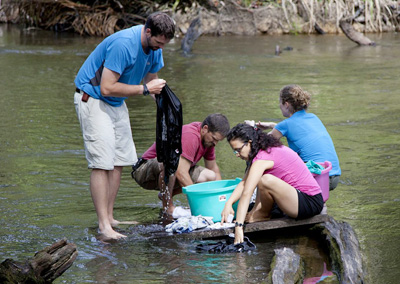 Participants in the International Mission Board’s new jungle training program wash clothes by hand in a river during their month-long stay in the Amazon. Learning to adapt to rustic living conditions is one emphasis of the experience. (BP Photo / Rebecca Springer, IMB)One trainee had an even more pressing concern as she gazed warily at the river flowing directly beside her cabin. With four children between the ages of 1 and 6, such proximity to fast-moving water made her uneasy.
Participants in the International Mission Board’s new jungle training program wash clothes by hand in a river during their month-long stay in the Amazon. Learning to adapt to rustic living conditions is one emphasis of the experience. (BP Photo / Rebecca Springer, IMB)One trainee had an even more pressing concern as she gazed warily at the river flowing directly beside her cabin. With four children between the ages of 1 and 6, such proximity to fast-moving water made her uneasy.
“I didn’t come in with a lot of expectations, because I didn’t know what to expect,” she said. “I didn’t know what our housing would be. I just had to be flexible and lower my expectations.”
Barger said going in unprepared was a planned part of the experience.
“If you tell them everything, it really isn’t as good a learning experience,” he explained. “Sometimes it’s good to not have all the answers and to think through how you’re going to respond. It’s good to let people discover that on their own.”
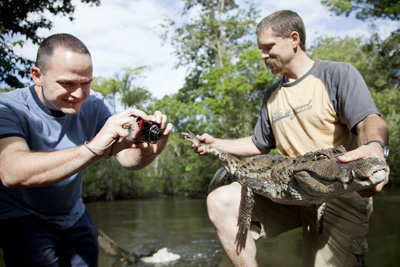 Missionaries at IMB’s jungle training camp document the features of a caiman, a species of small alligator indigenous to the Amazon Basin. While living in the jungle, participants learn to identify poisonous frogs and snakes, tarantulas, scorpions and carnivorous fish. (BP Photo / Rebecca Springer, IMB)For the next month, trainees lived in a closely packed community with few modern luxuries. No Internet or phone access. Generator-powered electricity was available only for a couple hours—most evenings. Food selection was limited to a hodge-podge of nonrefrigerated goods from a small local store, accessible only by canoe every few days. Indoor running water was precious, and the nearby river served as the community bathtub, washing machine, food disposal and transportation route.
Missionaries at IMB’s jungle training camp document the features of a caiman, a species of small alligator indigenous to the Amazon Basin. While living in the jungle, participants learn to identify poisonous frogs and snakes, tarantulas, scorpions and carnivorous fish. (BP Photo / Rebecca Springer, IMB)For the next month, trainees lived in a closely packed community with few modern luxuries. No Internet or phone access. Generator-powered electricity was available only for a couple hours—most evenings. Food selection was limited to a hodge-podge of nonrefrigerated goods from a small local store, accessible only by canoe every few days. Indoor running water was precious, and the nearby river served as the community bathtub, washing machine, food disposal and transportation route.
Despite the challenges, trainers emphasized their goal was to teach, not torture.
The trainees soon learned how to collect rainwater in barrels and pump it into their homes. They—and their children—quickly discovered how to avoid the huge thorn trees that lurked beneath the muddy river water, waiting for a bare misplaced foot.
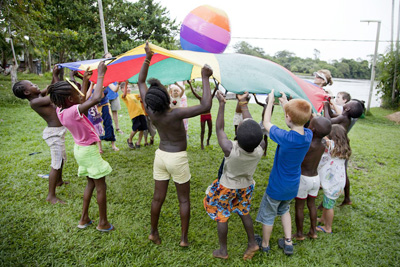 Children of IMB missionaries play games with local children in the Amazon. (BP Photo / Rebecca Springer, IMB)Meat was scarce, and a friendly competition soon arose over who could catch the biggest piranha or wolf fish for dinner. Killing scorpions and tarantulas became routine, and it was understood that privacy and silence didn’t exist during waking hours.
Children of IMB missionaries play games with local children in the Amazon. (BP Photo / Rebecca Springer, IMB)Meat was scarce, and a friendly competition soon arose over who could catch the biggest piranha or wolf fish for dinner. Killing scorpions and tarantulas became routine, and it was understood that privacy and silence didn’t exist during waking hours.
While braving the environment, the missionaries attended sessions on sharing the gospel with indigenous peoples. They also studied some of the most common obstacles missionaries face in rural cultures steeped in animism and witchcraft. Experienced missionaries provided tips on being a strong, godly family in isolated places.
The group practiced learning difficult, nonwritten languages. Participants learned to tell simple Bible stories to people who can’t read, and each family developed evangelism plans for their specific people group.
Each day’s schedule also included times for personal devotion, reflection and prayer.
“We’re spending a lot of time focusing on personal devotions,” Barger said. “While we have people in a close community with no electricity, no Internet or phone, no television or anything, we’re able to disconnect them and give them some solitude.”
Over the course of four weeks, participants fell into a practiced, if not necessarily comfortable, jungle routine. While the first day saw a group of nervous newbies, the group that sat by the airstrip a month later, laughing and joking about their unforgettable experience as they waited for their ride home, was dramatically different.
They were more creative cooks, better fishermen and semi-professional bug-killers. They were experts in navigating muddy terrain by touch and flashlight. And they were better Bible-storytellers, language learners and prayer warriors with established plans for reaching their people group with the gospel.















We seek to connect God’s story and God’s people around the world. To learn more about God’s story, click here.
Send comments and feedback to Eric Black, our editor. For comments to be published, please specify “letter to the editor.” Maximum length for publication is 300 words.